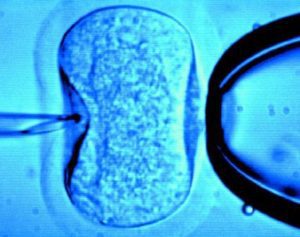In October, Catholic Sistas ran a heartrending and powerful story about one couple’s experience with in vitro fertilization (IVF). In today’s post, author Jenny Vaughn* answers some tough questions posed by readers about her experiences.
Have you heard of or considered Natural Procreative Technology (NaProTechnology)?
Yes. But we didn’t find out about NaProTechnology until after our retreats. At that point, we still had four frozen embryos in vials. So we focused on our frozen children first over attempting to get pregnant naturally.
 After we didn’t get pregnant from the transfers, I went on a strict diet for polycystic ovarian syndrome, which helped my body to begin cycling. We learned the Creighton Method, and consulted with a NaPro doctor for procedures that might help. The doctor suggested ovarian drilling and wedging, but I was overwhelmed by the invasive procedures I had gone through with IVF and didn’t want to do more. The Creighton Method made me a bit OCD about my mucus and some of the wording in the manual bothered my husband and me. So we decided that NaPro wasn’t for us.
After we didn’t get pregnant from the transfers, I went on a strict diet for polycystic ovarian syndrome, which helped my body to begin cycling. We learned the Creighton Method, and consulted with a NaPro doctor for procedures that might help. The doctor suggested ovarian drilling and wedging, but I was overwhelmed by the invasive procedures I had gone through with IVF and didn’t want to do more. The Creighton Method made me a bit OCD about my mucus and some of the wording in the manual bothered my husband and me. So we decided that NaPro wasn’t for us.
I went to a naturopathic doctor who put me on inositol (a B vitamin), reinforced my diet, and introduced me detoxing techniques such as hydrotherapy and castor oil packs on my liver. I am about eight months into this regimen, and am now having periods every month for the first time in my pubescent life. Other than these changes, we’re leaving the growth of our family up to God.
NOTE: NaProTechnology is a women’s health science that aims to help couples conceive by resolving the underlying health problems that hinder conception. All procedures and practices are in accord with the Church’s teaching on the sacredness of human life and the conjugal act between spouses. NaProTechnology can assist women in resolving a variety of reproductive health issues, not just infertility, and more information can be found at the NaProTechnology website.
Did you consider adoption before IVF? Have you considered adopting since finishing IVF?
Prior to IVF (while we were doing the intra-uterine insemination), we decided that if we had a chance to have a biological child of our own, we were going to do ALL we could to make that happen before adopting. Looking back, I now see that as selfishness–we wanted our own children and felt that if we adopted it just wouldn’t be the same. We feared we wouldn’t be able to love an adopted child as we would our own. We are planning on getting involved in foster care when our son is older and can understand why children are coming and going. If God leads us to adoption down the road, we will follow His will.
How did your family respond to your conversion?
Some of my family seem to agree and understand somewhat what has changed in me and why. Others do not agree; one of my cousins just gave birth to a baby that she and her husband purchased as an embryo (along with two of his sibling-embryos).
My mother was VERY resistant as I shared with her what God was showing me about the sacredness of fertility and human life. “How can you reject the procedure that gave YOU and your children life?!” she would ask repeatedly. She felt that I should be grateful and accepting of these procedures.
But as we discussed things more over the course of a year and she learned about the violence of most artificial reproductive technologies, as well as the slippery slope that they lead people down, she began to open up to the truth. Now she completely understands and agrees that artificial insemination and IVF go against God and His will for us. We talk about it openly and she prays that God helps me to share this story for the benefit of others. My sister and I have just reconnected in the last year, too, after a long estrangement and my experience of IVF was what triggered that reconciliation. Like my mother, she has understood and supported me.
How would you approach a person who is considering IVF (or has done IVF) to help them see the truth about it?
This is a hard question because I remember how resistant I was to anyone who spoke against IVF.

The tombstone for our deceased twins and their three embryonic brothers.
When talking to those who are just considering IVF, you may have take a more forthright approach, because there’s so much at stake. But you also have to consider your relationship with the person. My cousin and I were able to have a fairly candid conversation before she transferred the embryo she and her husband purchased last year. I simply told her I did not agree with her decision and that it broke my heart that we can participate in the commoditization of babies, who are so innocent and vulnerable.
If you perceive the person is exceptionally resistant, you may need to be very gentle. Mention that you read a story online about a couple that went through IVF (like mine) and encourage them to read it. Ask what is prompting them to take that route and if they have considered alternatives? Have they spoke to their priest? Do they believe life begins at conception? If so, encourage them to read how their babies will be treated.
For those who have done IVF, ask them to share their story with you. Let them share and ask questions about why they decided on that route. How many BABIES did you say were made? Ask them if they named them or buried the ones that died. Talk to them and acknowledge ALL the children that were created in the IVF process. Ask how they feel about the procedure now that they are on the other side. Allowing parents to speak of their journey and about the lives created is a non-confrontational way to encourage them to open their hearts to see things more clearly. There’s no point in browbeating them about the wrongness of the process, which would most likely just cause them to shut down and disconnect.
There’s one exception to this advice and that’s clergy–if you are a moral authority, you have a duty to point out that this procedure is profoundly offensive to the children’s dignity and to God. You must do this sensitively and gently, and you should be prepared for anger from the person, but love demands that our priests be willing to guide our errant souls to repentance for these sins, so that we may be reconciled with God.
During my own life-changing Confession, the priest told me, “All I know is that children conceived in this way…their rights are violated from the moment of their conception.” I was LIVID at him for saying that! I thought, “You are telling me–their MOTHER–that I would want these children so badly to do all of this, that I’m violating their rights in the process?!” Yet that experience triggered a deep and fundamental humbling in my soul that allowed God in. And He used it to start working on me in ways I couldn’t even comprehend and still cannot.
Sometimes, no matter how gentle or diplomatic you are, a person’s feelings will be hurt and they’ll be defensive and offended. But the discomfort of conflict is a small price to pay if we can save babies lives by helping people understand how their decisions impact those around them, even those yet to be conceived. Jesus was not always gentle or concerned about feelings, especially for a righteous cause like casting out the money changers in the temple.
Practically speaking, it’s a good idea to remind people if they believe life begins at conception, then embryos are babies and they deserve to be treated with dignity and respect. Emphasize the gory details if necessary–a woman having her vaginal walls pierced with a needle so that eggs can be aspirated from her ovaries is not dignified…embryonic babies being frozen and then housed in a laboratory is not respectful. Being sucked into a syringe and shot out into your mother’s womb–or even a stranger’s uterus–is violent, not to mention undignified. If these details are shocking to the person considering IVF, encourage the person to become more educated on how the procedure is done. Let the horror speak for itself.
*Jenny Vaughn in a pseudonym to protect the privacy of the author’s husband and son.
